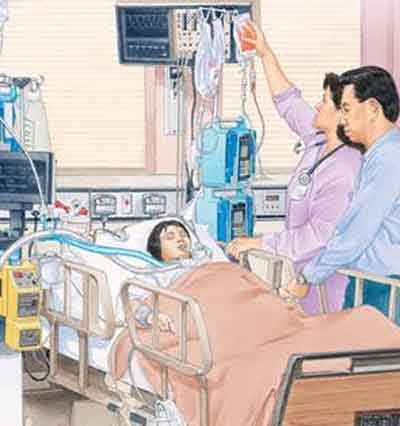- Home
- Editorial
- News
- Practice Guidelines
- Anesthesiology Guidelines
- Cancer Guidelines
- Cardiac Sciences Guidelines
- Critical Care Guidelines
- Dentistry Guidelines
- Dermatology Guidelines
- Diabetes and Endo Guidelines
- Diagnostics Guidelines
- ENT Guidelines
- Featured Practice Guidelines
- Gastroenterology Guidelines
- Geriatrics Guidelines
- Medicine Guidelines
- Nephrology Guidelines
- Neurosciences Guidelines
- Obs and Gynae Guidelines
- Ophthalmology Guidelines
- Orthopaedics Guidelines
- Paediatrics Guidelines
- Psychiatry Guidelines
- Pulmonology Guidelines
- Radiology Guidelines
- Surgery Guidelines
- Urology Guidelines
In-bed cycling exercise safe for ICU patients: Study

Ottawa : Contrary to the beliefs that intensive care unit (ICU) patients cannot afford any physical activity, early bicycle exercise during their stay in a hospital ICU may help some patients recover more quickly, a new study has found.
The "TryCYCLE" study that was published in the journal PLOS ONE demonstrated that physiotherapists can safely start in-bed cycling sessions with critically ill, mechanically ventilated patients early on in their ICU stay.
"People may think that ICU patients are too sick for physical activity, but we know that if patients start in-bed cycling two weeks into their ICU stay, they will walk farther at hospital discharge," said Michelle Kho, Assistant Professor at McMaster University, Hamilton in Ontario state, Canada.
The researchers studied 33 patients 18 years or older in the ICU at St. Joseph's Healthcare Hamilton. As a treatment, the patients in the ICU did 30 minutes of supine cycling using a motorised stationary bicycle affixed to the bed, six days a week.
"Early cycling within the first four days of mechanical ventilation among patients with stable blood flow is safe and feasible," the study found.
The researchers noted that patients who survive their ICU stay are at high risk for muscle weakness and disability.
"Muscle atrophy and weakness starts within days of a patient's admission to the ICU. Cycling targets the legs, especially the hip flexors, which are most vulnerable to these effects during bed rest," the study noted.

Disclaimer: This site is primarily intended for healthcare professionals. Any content/information on this website does not replace the advice of medical and/or health professionals and should not be construed as medical/diagnostic advice/endorsement or prescription. Use of this site is subject to our terms of use, privacy policy, advertisement policy. © 2020 Minerva Medical Treatment Pvt Ltd